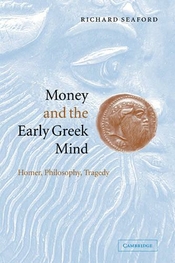
Money and the Early Greek Mind: Homer, Philosophy, Tragedy
How were the Greeks of the sixth century BC able to invent philosophy and tragedy? In this book Richard Seaford argues that a large part of the answer can be found in another momentous development, the invention and rapid spread of coinage which produced the first ever thoroughly monetised society. By transforming social relations, monetisation contributed to the ideas of the universe as an impersonal system (presocratic philosophy) and of the individual alienated from his own kin and from the gods (in tragedy). Seaford argues that an important precondition for this monetisation was the Greek practice of animal sacrifice, as represented in Homeric Epic, which describes a premonetary world on the point of producing money. This book combines social history, economic anthropology, numismatics and the close reading of literary, inscriptional, and philosophical texts. Questioning the origins and shaping force of Greek philosophy, this is a major book with wide appeal. Worked examples or Exercises
£38.99
Similar Deals

Duck Call
£10.00
From Stanfords

Fair Head Climbing Guide Book
£26.00
From Jackson Sport

Causeway Coast Way with Moyle Way Book
£10.99
From Jackson Sport

Log Book Holder Book
£14.99
From Jackson Sport

Ben Nevis - Winter Climbs - Selected Routes Book
£24.99
From Jackson Sport

Carrauntoohil & MacGillycuddys Reeks Book
£12.99
From Jackson Sport

Uncoiling The Ropes By Clare Sheridan Book
£16.99
From Jackson Sport

Belfast Twelve City Walks Guide Book
£12.00
From Jackson Sport


